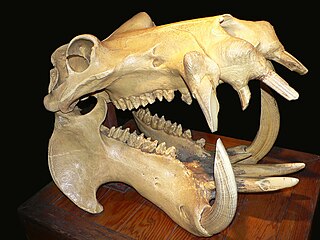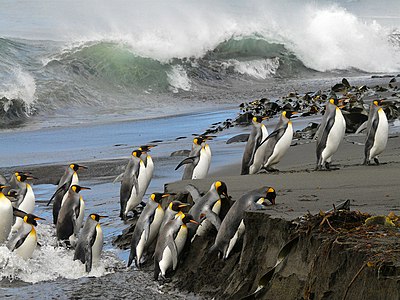Portal:Africa



Africa is the world's second-largest and second-most populous continent after Asia. At about 30.3 million km2 (11.7 million square miles) including adjacent islands, it covers 20% of Earth's land area and 6% of its total surface area. With nearly 1.4 billion people as of 2021, it accounts for about 18% of the world's human population. Africa's population is the youngest among all the continents; the median age in 2012 was 19.7, when the worldwide median age was 30.4. Based on 2024 projections, Africa's population will reach 3.8 billion people by 2099. Africa is the least wealthy inhabited continent per capita and second-least wealthy by total wealth, ahead of Oceania. Scholars have attributed this to different factors including geography, climate, corruption, colonialism, the Cold War, and neocolonialism. Despite this low concentration of wealth, recent economic expansion and a large and young population make Africa an important economic market in the broader global context. Africa has a large quantity of natural resources and food resources, including diamonds, sugar, salt, gold, iron, cobalt, uranium, copper, bauxite, silver, petroleum, natural gas, cocoa beans, and.
Africa straddles the equator and the prime meridian. It is the only continent to stretch from the northern temperate to the southern temperate zones. The majority of the continent and its countries are in the Northern Hemisphere, with a substantial portion and a number of countries in the Southern Hemisphere. Most of the continent lies in the tropics, except for a large part of Western Sahara, Algeria, Libya and Egypt, the northern tip of Mauritania, and the entire territories of Morocco, Ceuta, Melilla, and Tunisia, which in turn are located above the tropic of Cancer, in the northern temperate zone. In the other extreme of the continent, southern Namibia, southern Botswana, great parts of South Africa, the entire territories of Lesotho and Eswatini and the southern tips of Mozambique and Madagascar are located below the tropic of Capricorn, in the southern temperate zone.
Africa is highly biodiverse; it is the continent with the largest number of megafauna species, as it was least affected by the extinction of the Pleistocene megafauna. However, Africa also is heavily affected by a wide range of environmental issues, including desertification, deforestation, water scarcity, and pollution. These entrenched environmental concerns are expected to worsen as climate change impacts Africa. The UN Intergovernmental Panel on Climate Change has identified Africa as the continent most vulnerable to climate change.
The history of Africa is long, complex, and varied, and has often been under-appreciated by the global historical community. In African societies the oral word is revered, and they have generally recorded their history via oral tradition, which has led anthropologists to term them oral civilisations, contrasted with literate civilisations which pride the written word. During the colonial period, oral sources were deprecated by European historians, which gave them the impression Africa had no recorded history. African historiography became organized at the academic level in the mid-20th century, and saw a movement towards utilising oral sources in a multidisciplinary approach, culminating in the General History of Africa, edited by specialists from across the continent. (Full article...)
Selected article –
The Battle of Adwa (Amharic: የዐድዋ ጦርነት; Tigrinya: ውግእ ዓድዋ; Italian: battaglia di Adua, also spelled Adowa) was the climactic battle of the First Italo-Ethiopian War. Ethiopian army led by Ras Makonen Wolde Mikael managed to defeat the invading Italian force led by Oreste Baratieri on Sunday, March 1, 1896, near the town of Adwa. The decisive victory thwarted the campaign of the Kingdom of Italy to expand its colonial empire in the Horn of Africa. By the end of the 19th century, European powers had carved up almost all of Africa after the Berlin Conference; only Ethiopia and Liberia still maintained their independence. Adwa became a pre-eminent symbol of pan-Africanism and secured Ethiopian sovereignty until the Second Italo-Ethiopian War forty years later. (Full article...)
Featured pictures –
Did you know (auto-generated) -

- ... that former Arizona Cardinals kicker Cedric Oglesby, one of the first African-American kickers in NFL history, received his chance to play when the team's previous kicker injured himself celebrating?
- ... that Gil Scott-Heron's 1975 song "Johannesburg" was banned in South Africa during apartheid?
- ... that Louise Fulton was the first African American to win a professional bowling tournament?
- ... that the African Union has set up a space agency in a Space City?
- ... that Roland Jefferson, the first African-American botanist to work at the U.S. National Arboretum, helped preserve the famous flowering cherry trees in Washington, D.C.?
- ... that although it was only formed in late 1939, the French 87th African Infantry Division inflicted 6,600 casualties upon the German forces and fought until the very end of the Battle of France?
Categories
Selected biography –
Barthélemy Boganda (c. 1910 – 29 March 1959) was a Central African politician and independence activist. Boganda was active prior to his country's independence, during the period when the area, part of French Equatorial Africa, was administered by France under the name of Oubangui-Chari. He served as the first Premier of the Central African Republic as an autonomous territory.
Boganda was born into a family of farmers, and was adopted and educated by Roman Catholic missionaries after the death of his parents. In 1938, he was ordained as a Roman Catholic priest. During World War II, Boganda served in a number of missions and afterwards was persuaded by the Bishop of Bangui to enter politics. In 1946, he became the first Oubanguian elected to the National Assembly of France, where he spoke out against racism and the abuses of the colonial regime. He then returned to Oubangui-Chari to form a political organisation, culminating in the 1949 foundation of the Movement for the Social Evolution of Black Africa (MESAN), which became popular among villagers and the peasantry. Boganda was laicized from the priesthood after developing a relationship with and eventually marrying Michelle Jourdain, a parliamentary secretary. Nonetheless, he continued to advocate for equal treatment and fundamental rights for blacks in the territory well into the 1950s. As France conceded measures of representation to its colonies, MESAN won local elections and he gained influence in Oubangui-Chari's government, though his reputation suffered when he backed an unsuccessful economic scheme. (Full article...)
Selected country –
 |
 |
|

| ||
Egypt, officially the Arab Republic of Egypt, is a country in North Africa that includes the Sinai Peninsula, a land bridge to Asia. Covering an area of about 1,001,450 square kilometers (386,560 sq mi), Egypt borders Libya to the west, Sudan to the south, and the Gaza Strip and Israel to the east. The northern coast borders the Mediterranean Sea and the eastern coast borders the Red Sea.
Egypt is one of the most populous countries in Africa. The vast majority of its estimated 78 million people live near the banks of the Nile River in an area of about 40,000 km² (15,000 sq mi) where the only arable agricultural land is found. Large areas of land form part of the Sahara Desert and are sparsely inhabited.
Egypt is famous for its ancient civilization and some of the world's most famous monuments, including the Giza pyramids and the Great Sphinx; the southern city of Luxor contains a particularly large number of ancient artifacts such as the Karnak Temple and the Valley of the Kings. (Read more...)
Selected city –
Nairobi (/naɪˈroʊbi/ ny-ROH-bee) is the capital and largest city of Kenya. The name is derived from the Maasai phrase Enkare Nairobi, which translates to 'place of cool waters', a reference to the Nairobi River which flows through the city. The city proper had a population of 4,397,073 in the 2019 census. The city is commonly referred to as 'The Green City in the Sun'.
Nairobi is home of the Kenyan Parliament Buildings and hosts thousands of Kenyan businesses and key international companies and organisations, including the United Nations Environment Programme (UN Environment) and the United Nations Office at Nairobi (UNON). Nairobi is an established hub for business and culture. The Nairobi Securities Exchange (NSE) is one of the largest stock exchanges in Africa and the second-oldest exchange on the continent. It is Africa's fourth-largest stock exchange in terms of trading volume, capable of making 10 million trades a day. It also contains the Nairobi National Park. Nairobi joined the UNESCO Global Network of Learning Cities in 2010. (Full article...)
In the news
- 12 February 2024 –
- Two boats collide on the Congo River near Kinshasa, Democratic Republic of the Congo; with the death toll remains unclear. (AP)
- 11 February 2024 – 2023 Africa Cup of Nations
- In association football, hosts Ivory Coast win their third Africa Cup of Nations by defeating Nigeria 2–1 in the final. Sébastien Haller scores the winning goal in the 81st minute. (The Guardian)
- 10 February 2024 – Somali civil war
- Four Emirati soldiers and a Bahraini military officer are killed, while ten other people are injured, when a soldier opens fire at a military base in Mogadishu, Somalia, before being killed in the ensuing shootout. Al-Shabaab claims responsibility. (AP)
- 10 February 2024 –
- A Eurocopter EC130 helicopter crashes near Nipton, California, United States, killing all the six people on board, including Nigerian banker Herbert Wigwe. (CBS News)
- 10 February 2024 – 2023–2024 Senegalese protests
- Violent protests occur in Senegal following an announcement by President Macky Sall that presidential elections have been delayed from February 25 to December 15. (Sky News)
- 9 February 2024 –
- At least 18 people are killed during a collision between a bus and a truck on a road in Kinshasa, Democratic Republic of the Congo. (AP)
Updated: 16:33, 14 February 2024
General images -
Africa topics
More did you know –
- ...that from 1926 to 1940, the Union Minière du Haut Katanga had a virtual monopoly of the world uranium market?
- ...that Anfillo is an endangered language of Western Ethiopia, spoken only by a few hundred adults above sixty?
- ...that Bono Manso, the capital of Bono state, was an ancient Akan trading town in present-day Ghana, which was frequented by caravans from Djenné as part of the Trans-Saharan trade?
- ...that Reverend John Chilembwe is celebrated as the first Malawian nationalist, and was a martyr for his cause?
Related portals
Major Religions in Africa
North Africa
West Africa
Central Africa
East Africa
Southern Africa
Associated Wikimedia
The following Wikimedia Foundation sister projects provide more on this subject:
-
Commons
Free media repository -
Wikibooks
Free textbooks and manuals -
Wikidata
Free knowledge base -
Wikinews
Free-content news -
Wikiquote
Collection of quotations -
Wikisource
Free-content library -
Wikispecies
Directory of species -
Wikiversity
Free learning tools -
Wikivoyage
Free travel guide -
Wiktionary
Dictionary and thesaurus

























































































